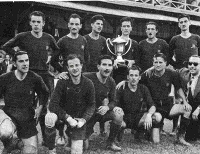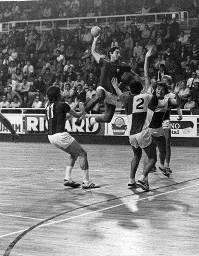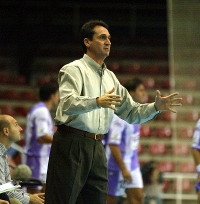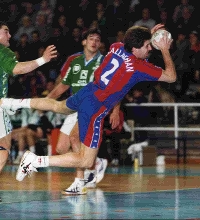HISTÒRIA DE LA SECCIÓ D’HANDBOL





HISTORY OF THE HANDBALL SECTION
The handball section was officially founded on November 29, 1942, although there are references to friendly matches played by Barça in the thirties.
This sport was originally played by eleven players on full-size football pitches, and it was not
until the fifties that the game was played as it is today, by teams of seven players in indoor
courts.
Success at 11-a-side game
The handball team soon found success. They won the double of the Catalan and Spanish
Championships for three seasons in a row in the mid forties. And two further doubles were won in
1949 and 1951. In the 1950s, Barça’s handball team would win one more Spanish and four more
Catalan Championships
Consolidation of the modern game
Barça went with fashion and switched to the indoor seven-a-side variant, but found no major
success until the late sixties and a league and cup double in 1969. The Palau Blaugrana was
constructed shortly after, and provided the perfect home for Barça’s indoor sports teams, and
also the consolidation that handball needed at the club. And although the seventies was a decade
dominated by Granollers, Calpisa and Atlético Madrid, and Barça only managed two cups and a league,
the section was growing, and was on the verge of its most successful period ever.
The golden age begins
The eighties began with two League titles and one Copa del Rey, which coincided with the
arrival of Valero Rivera as head coach in 1984. Rivera would lead the team to more titles than ever
before, as Barça collected silverware not just in Spain, but in Europe too for two amazing decades.
FC Barcelona came to dominate Spanish handball, winning five consecutive league titles from 1987 to
1992 and another five from 1995 to 2000, as well as collecting nine Cup titles up to the year 2000.
All conquering in Europe
Barça ruled supreme in Spain, and that dominance was spread into European competitions too.
Led by Serrano and Sagalés, three consecutive Cup Winners Cups were won in the mid eighties. Then,
Barça won its first European Cup in 1991, followed by two consecutive Cup Winners Cups in the
mid-nineties. But this was just the start of it. From 1996 to 2000, Valero Rivera’s team set
an amazing record by winning no fewer than five European Cups in a row, something no team had ever
done before, and no team is ever likely to do again. To top it all off, Barça also won four
consecutive European Super Cups.
Goodbye to the 'Dream team' and a new model
In the 2003-2004 season, Valero Rivera stepped down as manager, along with one of the
greatest handball players of all time, Enric Masip. When Urdangarín, Guijosa, Ortega, Xepkin and
O'Callaghan, among others, moved on too, the unrepeatable days of the Dream Team drew to a close.
The vacancy left by Rivera was filled Xesco Espar, while Masip and O'Callaghan stayed at the club
in administrative roles. But despite the major changes, the success continued. Led by captain David
Barrufet, a survivor of the Dream Team, and with new players of such class as Nagy, Skrbic and Iker
Romero, the team has held its place among the elite of the sport, as shown by a seventh Champions
League and the Asobal League title in 2006.
Table 2011/12
| Teams | ||
|---|---|---|
| Position | Teams | Pts |
| 1 | FC Barcelona Intersport | 58 |
| 2 | Atlético de Madrid | 57 |
| 3 | Reale Ademar León | 44 |
| 4 | Cuatro Rayas BM Valladolid | 43 |
| 5 | Caja 3 BM Aragón | 32 |
| 6 | Ciudad Encantada | 31 |
| 7 | Naturhouse La Rioja | 29 |
| 8 | Fraikin BM Granollers | 26 |
| 9 | Torrevieja | 26 |
| 10 | AMAYA Sport San Antonio | 24 |
| 11 | Huesca | 22 |
| 12 | Helvetia Anaitasuna | 22 |
| 13 | Academia Octavio | 20 |
| 14 | Quabit BM Guadalajara | 18 |
| 15 | Maygar BM. Antequera | 17 |
| 16 | Alser Puerto Sagunto | 11 |
Official sponsors
Copyright - FCBarcelona | Legal Terms | Buy tickets FC Barcelona | This is the FC Barcelona official website


